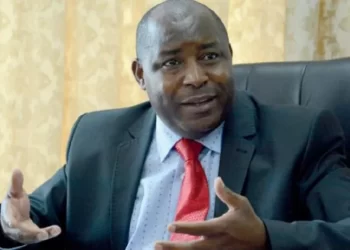Former Second Deputy Governor of the Bank of Ghana (BoG), Mrs. Elsie Addo Awadzi, has been appointed the first-ever Women in Public Leadership Fellow at the University of Oxford prestigious Blavatnik School of Government.
The newly created fellowship — the first of its kind at the institution — is designed to address the chronic underrepresentation of women in senior public leadership positions across the world, particularly in fields such as economic policy, regulatory reform, and crisis management.
Trailblazing appointment
Mrs. Addo Awadzi’s selection marks another milestone in a career that has spanned three decades of distinguished service in economic policy, financial regulation, and governance, both within Ghana and on the international stage.
The fellowship will enable her to bring this wealth of experience to Oxford, where she will lead a series of initiatives aimed at strengthening leadership capacity among women in public institutions, especially in Africa.
During her fellowship year, Mrs. Addo Awadzi will engage in a combination of teaching, research, and mentorship.
She is expected to develop a teaching case on emerging challenges in the international financial system, deliver guest lectures to students of the Master of Public Policy (MPP) programme, and conduct a masterclass on public leadership.
Additionally, she will mentor postgraduate students — with a particular focus on women — on navigating leadership careers while maintaining personal balance, and design a pilot programme to support senior women in Africa’s public sector to advance into top decision-making roles.
Oxford’s recognition of a Ghanaian leader
In announcing her appointment, Professor Ngaire Woods, Dean of the Blavatnik School of Government, praised Mrs. Addo Awadzi’s professional accomplishments and her contribution to financial governance in Ghana.
“Elsie is a trail-blazing public leader from Ghana with deep expertise in economic governance and financial sector development, who has led major public initiatives, including cleaning up Ghana’s financial sector following a crisis that highlighted the need for stronger oversight and governance,” Professor Woods said. “We are delighted to welcome Elsie to the School.”
Prof. Woods further noted that the fellowship was part of the Blavatnik School’s broader commitment to empowering women leaders and fostering diversity in public leadership globally.
Elsie Addo Awadzi’s reflections
In her response, Mrs. Addo Awadzi described the fellowship as a “unique opportunity” to advance thought leadership in governance, regulation, and public policy on a global platform.
“I look forward to a year of rigorous intellectual engagement, meaningful collaboration, and shared learning,” she said.
“The Blavatnik School represents an extraordinary environment of academic and professional excellence under the dynamic leadership of Professor Ngaire Woods. I am deeply grateful for the privilege to contribute in some measure to its mission: a world better led, better served, and better governed.”
A distinguished career of service
Before her appointment to Oxford, Mrs. Addo Awadzi served as the Second Deputy Governor of the Bank of Ghana from 2018 to 2023, where she was responsible for financial institutions regulation, supervision, and ensuring the stability of the banking sector.
She played a crucial role on the Bank’s Board of Directors and the Monetary Policy Committee and represented the institution on several national and international policy platforms.
Her tenure coincided with one of the most challenging periods in Ghana’s financial sector history — the banking crisis of 2017–2019 — during which she was instrumental in leading regulatory reforms that helped restore confidence and stability in the industry.
Prior to joining the central bank, Mrs. Addo Awadzi served as a Senior Counsel at the International Monetary Fund (IMF) in Washington, D.C., where she advised member countries on banking reforms, crisis management, and fiscal governance.
She was also a key resource in IMF training programmes for finance officials and regulators across emerging markets.
Commitment to leadership and mentorship
Mrs. Addo Awadzi’s appointment at Oxford also reconnects her with her alma mater.
She is an alumna of the Blavatnik School’s Executive Public Leaders Programme, which focuses on strengthening leadership and policy impact among senior public officials.
Her new fellowship, however, takes her influence a step further — from participant to thought leader — as she helps shape the next generation of global policymakers and women leaders.
The fellowship’s broader goal, according to the Blavatnik School, is to provide a platform for exceptional women in public service to reflect, teach, and collaborate on innovative solutions to governance challenges worldwide.
It also seeks to inspire more women to enter and excel in leadership roles across the public sector.
Breaking barriers for women in public leadership
Globally, women remain underrepresented in senior positions in public administration, finance, and policymaking.
In Africa, where systemic and cultural barriers continue to limit women’s advancement, Mrs. Addo Awadzi’s recognition stands as both an inspiration and a call to action.
By leading the inaugural Women in Public Leadership Fellowship, she joins a small but growing network of African women who are reshaping international governance from within global academic and policy institutions.
Her experience — from IMF corridors to the Bank of Ghana’s high-level policy tables — embodies the kind of cross-sector expertise the fellowship aims to cultivate in future leaders.
As she begins her fellowship year, observers within Ghana’s financial and academic communities have hailed her appointment as a source of national pride and a testament to the country’s growing contribution to global economic leadership.
Mrs. Addo Awadzi’s work at Oxford is expected to not only amplify Ghana’s visibility in international governance circles but also foster stronger collaboration between African policymakers and leading global institutions.
In many ways, her journey reflects the promise of the fellowship itself: empowering capable women to transform governance — one institution, one country, and one generation at a time.












